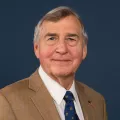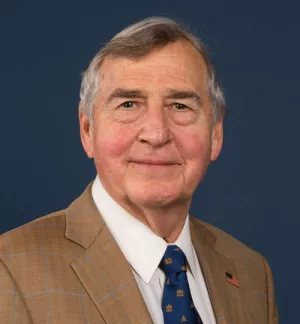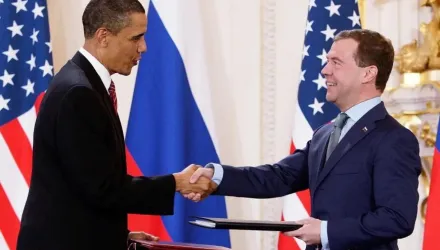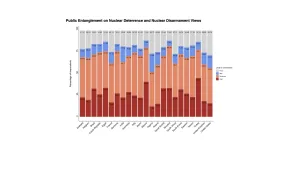Kazakhstan TV''s interview with Graham Allison
Dr. Allison is chair of the Caspian Studies Program at Harvard University. This interview aired on Friday, February 1, 2002.
INTERVIEWER: It is not just heads of state and diplomats who determine the development of interstate relations. For instance, the Belfer Center of Science and International Affairs is one of the most influential "brain trusts" in the United States. Operating as part of the Kennedy School of Government at Harvard University, it provides long-term analysis of the current state of the world, which has changed so much since the end of the Cold War. Graham Allison, a former U.S. assistant secretary of defense and nowadays a university professor, is director of this research center. He is convinced that Kazakhstan has a major role to play in the strategic allocation of forces in the world arena. We recently had a chance to meet this prominent American political scientist at Harvard.
Doctor Allison, you are one of the U.S. experts who stresses that we should not underestimate the role of Kazakhstan in the disarmament process. From your point of view, how can Kazakhstan contribute to solving such a difficult problem as nonproliferation of nuclear weapons?
ALLISON: First of all, it is necessary to give due tribute to the significant role that Kazakhstan has historically played in the area of nuclear nonproliferation. Kazakhstan is one of the few states that had an arsenal of a nuclear superpower quite within its reach. It decided to return these weapons to Russia and this decision was the right one. If Kazakhstan had made an attempt to establish the operating control over this nuclear arsenal of more than 1200 strategic warheads— carried mainly by intercontinental ballistic missiles that were aimed at the United States— such a decision would have led to a crisis with unpredictable consequences and potentially catastrophic scenarios.
However, thanks to President Nursultan Nazarbayev and to the Kazakh people— who had a lot of suffering inflicted upon them as a result of nuclear tests in Semipalatinsk— Kazakhstan has proclaimed its non-nuclear status...
Moreover, when Kazakhstan found about 500 kilograms of highly-enriched uranium in 1994 and 1995— uranium that had remained on its territory since a Soviet-era marine fuel production enterprise— it did not keep these materials or sell them to rogue states like Iran or Iraq. Instead it chose the responsible solution and signed special treaties with the United States, and these materials were transferred to the complex in Oak Ridge, Tennessee. Had terrorists obtained these materials, they would have been able to create twenty nuclear weapons.
INTERVIEWER: Indeed, there was a time when people talked a lot about the transportation of nuclear materials via air from Kazakhstan to the United States.
ALLISON: This operation had the code name of "Sapphire." I am very well informed about the details of this operation, since I was involved in it when I was assistant secretary of defense.
INTERVIEWER: (summarizing) Allison also emphasized the "valuable personal role" Nursultan Nazarbayev played in the process of nuclear disarmament. Allison said this with strong assertiveness, since he himself wrote the introduction to Nazarbayev''s book Epicenter of Peace, a book that was dedicated to this particular problem of nonproliferation. Allison said it is also necessary to note that Kazakhstan''s new role as an oil power was a focal point of the recent Washington summit between President Nazarbayev and President Bush, and indicated that Kazakhstan is very interested in various pipeline routes for oil export. Along with Russia, Kazakhstan plays a role as one of the large reliable energy sources outside of OPEC. This fact will lead to Kazakhstan''s growing international role.
INTERVIEWER: How would you describe the recent visit of President Nazarbayev to the United States?
ALLISON: In my opinion, this visit was quite a success. President Bush and President Nazarbayev made a valuable and weighty statement on the essence of the relationship between the two counties. This is the positive aspect of the visit. I would characterize as negative the fact, however, that the role which Kazakhstan has played in the field of nuclear nonproliferation was not sufficiently emphasized— nor was the role Kazakhstan could play in this area in the future. In particular, I am thinking of the efforts to establish a nuclear weapons-free zone in Central Asia
INTERVIEWER: Do you think that Kazakhstan could do much in the field of nonproliferation of other weapons of mass destruction— especially considering Americans'' fear of anthrax?ALLISON: There is no doubt about that. I think here we should not only talk about the fear of anthrax, but also about a possible anthrax attack. It appears that those who launched this recent wave of anthrax attacks were our own "homegrown" terrorists. However, biological and chemical weapons were also developed in Kazakhstan during the Soviet era. INTERVIEWER: Speaking of current events, how would you characterize the cooperation between Kazakhstan and the United States in the course of the antiterrorist campaign? ALLISON: In my opinion, here we can speak of a rather positive relationship and a broad cooperation between the two countries. Remember for instance the statements made by Secretary of State Powell and by President Bush. Kazakhstan''s readiness for interaction and assistance seems to be entirely meeting George Bush''s expectations. The operation in Afghanistan does not affect Kazakhstan to the same degree as it does Tajikistan, Uzbekistan, or Kyrgyzstan, which have common boundaries with Afghanistan. In the case of Kazakhstan, this cooperation is more generally oriented. However, we should not forget about Kazakhstan''s extremely useful contacts in the field of intelligence, as well as its desire to expand its cooperation. INTERVIEWER: (summarizing) In conclusion, Allison pointed out that the cooperation between Kazakhstan and the United States is not limited by the extent of the current antiterrorist campaign. Instead, we should speak of a strategic partnership between the two countries for many years to come.
Interview conducted by Jury Kiril''chenko and Alexey Berezhkov at Harvard University, and aired on TASS and Kazakhstan TV on February 1, 2002. Interview transcript translated by Sergey Ladinsky of the Strengthening Democratic Institutions Project.
Allison, Graham. “Kazakhstan TV's interview with Graham Allison.” Belfer Center for Science and International Affairs, Harvard Kennedy School, February 1, 2002





